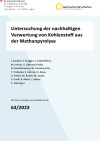Suchergebnisse
Bio-Minimum-Lubrication
Entwicklung eines Minimalmengenkühlschmier-Systems für den Einsatz in der zerspanenden Metallbearbeitung unter Verwendung von Emulsion auf Basis nachwachsender Rohstoffe
Die Papierfabrik im Jahr 2030
Papierfabrik im Jahr 2030 als integrierter Bestandteil einer nachhaltigen Wirtschaft und als Anbieter von nachhaltigen Papierprodukten, mit höchstmöglicher Erfüllung der Kriterien für Nachhaltigkeit.
Entlacken als Dienstleistung
Entwicklung der Dienstleistung der Entlackung in industriellen Oberflächenbehandlungsanlagen auf Basis von impulsgesteuertem Hochdruckwasser mit neuartiger, energieeffizienter Hochdruckwasserpumpe. Suche und Evaluierung von weiteren Anwendungsmöglichkeiten.
Grüne Bioraffinerie - Verwertung der Grasfaserfraktion
Grundsätzliche Versuche zur Klassifizierung und Verwertung von abgepressten Gras. Die Verwendung der Grasfaserfraktion zur Herstellung von Produkten für die Anwendungsbereiche Dämmmaterial, Pflanzmedium und Tierfuttermittel wird exemplarisch untersucht.
Faser- Und Färbepflanzen

Potenziale für Erzeugung, Verarbeitung und Einsatz in Österreich
Forschungsforum
1/2002
Herausgeber: BMVIT
Deutsch, 6 Seiten
Downloads zur Publikation
Berichte aus Energie- und Umweltforschung 17/1996 Österreichischer Cleaner Production Roundtable 1996

Tagungsband der Veranstaltung in Linz, 12. November 1996
Berichte aus Energie- und Umweltforschung 21/1997 Österreichischer Cleaner Production Roundtable 1997

Tagungsband der Veranstaltung, 11. November 1997, Graz
Untersuchung der nachhaltigen Verwertung von Kohlenstoff aus der Methanpyrolyse

Eine der möglichen alternativen Produktionsrouten für erneuerbaren Wasserstoff ist die Methanpyrolyse. Gegenüber anderen, alternativen Erzeugungswegen weist die Methanpyrolyse bei einer sehr hohen Wasserstoffausbeute den geringsten Energieaufwand (weniger als ein Viertel der Wasserelektrolyse) auf.
Schriftenreihe
63/2023
J. Burkert, K. Brugger, L. Haberfellner, M. Lehner, R. Obenaus-Emler, R. Hood-Nowotny, M. Puschenreiter, T. Prohaska, S. Zabrian, N. Alaux, A. Passer, M. Ruschi, M. Saade, S. Duelli, R. Maier, J. Mayer, K. Steininger
Herausgeber: BMK
Mehrsprachig, 88 Seiten
Downloads zur Publikation
FABRIK der Zukunft Hintergrundband Teil 1
Der vorliegende Hintergrundband soll einen umfassenden Überblick über die hervorragenden Ergebnisse aus der Programmlinie "Fabrik der Zukunft" geben, wobei insbesondere die Projekte der 1. und 2. Ausschreibung der Programmlinie dargestellt werden.
Wood Plastic Composites - WPC

future-proof materials from wood composites- projects within the "Factory of tomorrow" subprogram
Forschungsforum
2/2007
Herausgeber: BMVIT
Englisch, 6 Seiten
Downloads zur Publikation
The development of fused wood-only parquet elements
The development of the wood fusing technology to an innovative, ecological process of production of wood-only parquet elements, which do not contain any wood foreign substances as glue or thermoplastics.
Berichte aus Energie- und Umweltforschung 18/1997 Entwicklung des ökologischen Faserwerkstoffs "ZELFO 2"

Ein alternativer Werkstoff
Gewinnung von adsorptiven Produkten aus Maisreststoffen
Entwicklung und Erprobung von Verfahren zur Erzeugung adsorptiver Produkte aus Reststoffen der Körnermaisproduktion mit Schwerpunkt auf der Spindelverwertung in Hinblick auf ölbindende Materialien.
Entwicklung von geschweißten Vollholz-Parkettelementen
Die Entwicklung der zur Patentierung angemeldeten Holzschweißtechnik als innovative, ödologische Produktionstechnologie zur Herstellung von Vollholz-Parkettelementen, die keine holzfremde Substanzen wie Leim oder Thermoplaste etc. enthalten.
Grüne Bioraffinerie - Gewinnung von Proteinen aus Grassäften
Erforschung und Entwicklung eines technischen Verfahrens zur Proteingewinnung aus Gras, in Hinsicht auf Hochprotein-Futtermittel mittels Ultrafiltration und diversen Aufschlußverfahren.
Watersorption - Water absorption of Wood Plastic Composites
Analysis of the water absorption in Wood Plastic Composites (WPC) in order to develop solutions to decrease and stop water absorption. This enables a big variety of new applications made of WPC and brings economical and ecological advantages for the polymer processing industries.
Berichte aus Energie- und Umweltforschung 17/1997 Stoffliche Nutzung nachwachsender Rohstoffe

Untersuchung der Stoffflusswirtschaft auf der Basis nachwachsender Rohstoffe
Chemistry, process design and sustainable economic development
The results of this project were to deliver the basics for chemical process engineering taking into account the requirements of sustainable development. The proposed results will have to be in conformity with ecological, economic and social requirements for sustainability. Hence the processes will mostly be based on renewable resources.
Berichte aus Energie- und Umweltforschung 7/1999 Österreichischer Roundtable on Cleaner Production 1999

Tagungsband mit Sammlung der Beiträge der Plenarvortragenden
Watersorption - Wasseraufnahme von Wood Plastic Composites
Untersuchung von Wasseraufnahme und -transport in Wood Plastic Composites (WPC), um Lösungsansätze zur Verringerung und Unterbindung der Wasseraufnahme zu erarbeiten. Dies eröffnet dem Werkstoff eine Vielzahl neuer Anwendungsmöglichkeiten, was sowohl ökonomische als auch ökologische Vorteile für die kunststoffverarbeitende Industrie bringt.
